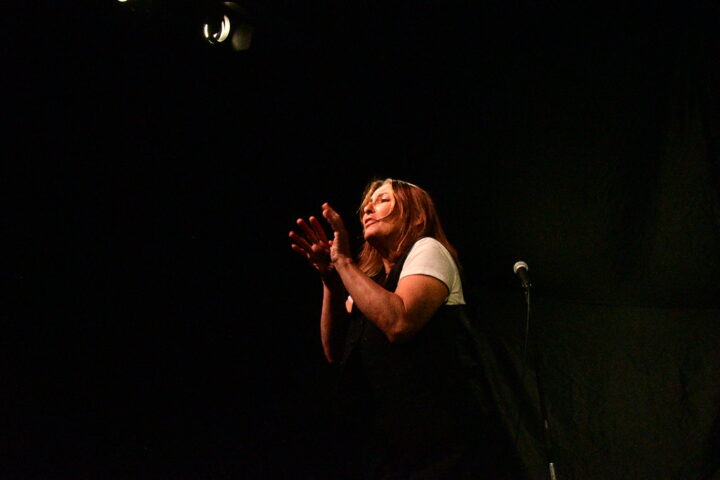The Populist Tango
By Beverly Andrews
Art in many ways can foreshadow where societies are heading. At such a turbulent moment in history, with unfortunate echoes of the 1930's, many historians now openly question where exactly we are headed and could we be doomed to repeat the mistakes of the past? A new production in London possibly supplies an answer to this very question. Although written several decades ago this stripped back production of Tim Rice and Andrew Lloyd Webber's classic musical Evita directed by Jamie Lloyd highlights how the journey from a healthy democracy to a fascist dictator is perhaps a shorter one then we might initially think.
Jamie Lloyd's radical reworking of this classic could not have come at a more opportune moment, with its story of a television star who manages to sleep her way to the very top and ends up becoming Argentina's first lady. The story of Eva Perón has fascinated many for generations, with her rags to riches true life tale; a child of the country’s slums who ends up becoming not only its first lady but also for some a religious icon. Her effortless connection to the disenfranchised in Argentina in many ways was the necessary ingredient which ultimately propelled Juan Perón to power. But how real Evita’s desire was to truly change the lives of the poor, is still a subject for debate even today. Was it really about helping others or a desperate desire to escape the poverty which she was born into?
When Evita first premiered in the 1970's the emphasis was on its epic scale, its sweeping romanticism and of course the towering performance of Elaine Page in the title role. Jamie Lloyd's production strips all this away and reveals a far grittier and more perceptive piece than one might have expected; a musical which reveals itself to be a perceptive look at what happens when populist figures secure power, highlighting the fact that they often become hollow vessels on which we project our own political desires. A point stated throughout by the character of Che Guevara, (played with a searing honesty by Trent Saunders) another political icon of the era, who acts as the moral compass of the piece. At one point he asks Evita why she doesn’t truly work to change the system instead of simply setting up charities to feed the poor. She replies that she didn't create the system, therefore she has no real power to change it.
Historically the Peronist movement started life as a coalition between Argentina’s left (artists, trade unionists and social reformers) and the far right. The coalition broke down when Juan Perón - after a period of eighteen years in exile caused by a successful military coup against him - returned to power. Almost immediately after his return, the Ezeiza massacre took place, where right wing members of Perón’s party targeted supporters on the left, killing many. This elimination of left-wing Peronist's activists accelerated after his death when his second wife Isabel signed a number of decrees empowering the military and the police to act as virtual death squads and "annihilate" left-wing activists. Her government was overthrown by an American backed military coup, which heralded Argentina's darkest period, the so called “dirty war”, a conflict which cost the lives of up to 30,000 Argentinians, many tortured before they were killed, while thousands of others fled the country. There are Argentinians even today still seeking to discover information on what happened to their love ones. Although Eva and Juan Perón were not in power when the most harrowing events of this period took place, the infighting within the Peronist movement itself and the death squads which were launched by Juan Perón on his return to power in many ways could be said to have opened the door to what followed.
Eva Peron's legacy though is in fact complex, Cristina Elisabet Fernández de Kirchner Argentina's second female president and the first to be elected, credits Evita with opening the door to the possibility of female presidents in Latin America. And occupying the left wing of the Peronist party Kirchner did in fact bring in many social reforms including the Universal Child Allocation for poorer families. Her government though was eventually engulfed in corruption scandals, marring much of her second term in office.
You feel with the Peronist movement that they will forever be standing in Eva Perón’s shadow, where nothing is ever as it appears to be. It’s interesting to note that during Kirchner’s second term in office, the bank of Argentina issued a new note with the image of Evita on its front thus reinforcing her importance to the party.
This particular production of Evita is a shimmering delight with a towering performance by Samantha Pauly in the title role. Wearing a white slip and sneakers throughout, Pauly portrays Evita as a kind of “home girl” on the make, determined to make it to the top. The only problem is that once she gets there she has nowhere left to go. In life Eva Perón’s image was too valuable to be lost even after her premature death from cancer, so her corpse was ordered to be embalmed by her husband and put on display for the public not once but twice: Immediately after Evita’s death and once again after Juan Perón’s returned to power. After the General’s unexpected death, Evita’s corpse was once again briefly displayed becoming a kind of macabre talisman of the party’s legitimacy.
Evita shows the power of image over substance and that the road to fascism is not one in which you arrive at your destination in a single step. It's rather a series of single events which propels you along this dangerous path. It’s a journey which can be taken by any country in the world where there is a combination of economic turbulence and a political vacuum. Looking at our current political problems throughout the world we may be further down this road then we might think and if calmer, wiser voices do not prevail the appeal of populist leaders will simply grow.
form-idea.com, 23rd August 2019.

 Samantha Pauly as Eva Perón and Company. Photo Marc Brenner
Samantha Pauly as Eva Perón and Company. Photo Marc Brenner

 Photo Credit © Marc Brenner
Photo Credit © Marc Brenner











